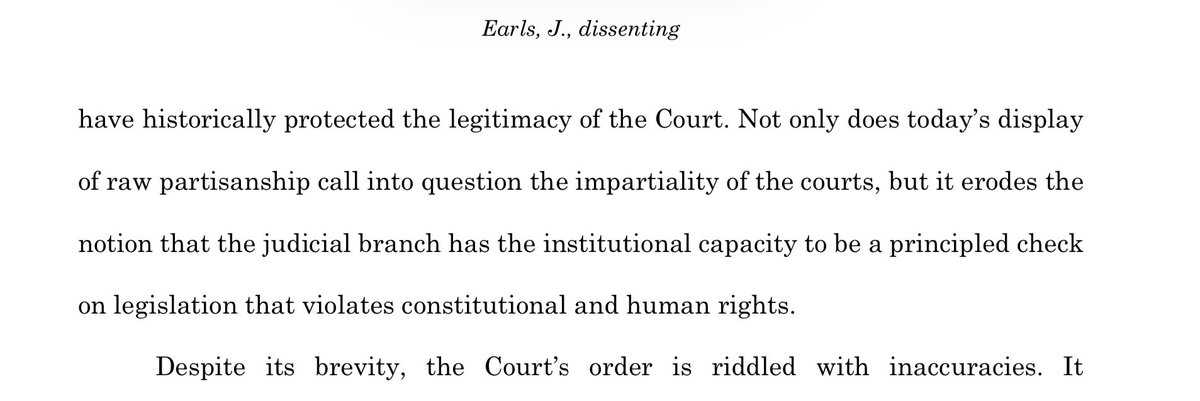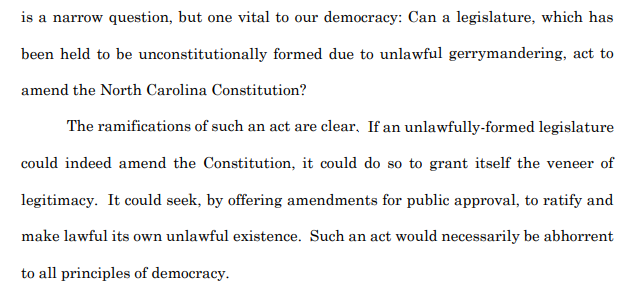
The NC Supreme Court, with its new GOP majority, is hearing arguments now in a lawsuit over voting rights for people with felony convictions. WATCH: #ncpol #ncga 

Last year, people with felony convictions who were on probation or parole were able to vote for the first time. The courts struck down the ban on those people voting violated the state constitution. But the high court could undo that.
NCGA is pointing to their expert witness, who said the ban wasn't discriminatory. Justice Anita Earls, former civil rights attorney, says the trial court found the NCGA expert's testimony was entitled to "no weight" because it was fundamentally flawed.
NCGA's lawyer argues that if the re-enfranchisement law was unconstitutional, the lower court should have struck it down, , instead of allowing people on probation to vote. This would've meant that no one with felony convictions could vote.
Now Justice Morgan, the only other Dem and only other Black justice, is asking why "strict scrutiny" shouldn't apply? NCGA's lawyer says it's because people with felony convictions explicitly have no right to vote under the state constitution. 

The original law at issue was enacted in 1840. And NCGA's lawyer argues that it couldn't have been motivated by racism, because Black people couldn't vote then. He also argues the later revisions weren't motivated by racism.
Earls is quoting from a 2001 redistricting decision (by a GOP majority) that had to reconcile conflicting provisions of the state constitution. More on that case: facingsouth.org/2021/08/racial…
Justice Richard Dietz, elected last year, asks if the rest of the law could stand if the court struck down the provision that bans voting by people on parole or probation. That's the only question by a GOP justice so far.
Justice Morgan asks about the impact on people who are still on probation or parole because they can't pay court fines or fees. Doesn't that raise a question about Equal Protection? NCGA's lawyer points to rulings by other courts rejecting that argument.
Dietz asks Stanton Jones, lawyer for the voters, whether the court should strike down the entire re-enfranchisement statute. (This is a scary possibility, even though it would technically be a win for the voters?)
Jones argues that striking down the entire law would "wreak havoc" on elections. Hundreds of thousands of people would be removed from the voter rolls. "It's simply not workable." So the court had to change the standard. #ncpol
It would also contradict NCGA's longstanding policy choice. And the trend in recent decades has been to expand the franchise. Striking down the whole law would disenfranchise people "in a way that has never been the law" in NC.
Justice Berger Jr. (whose dad is once again a defendant in the case) is asking about the provisions of the law. I'm guessing that his point is that the law doesn't say "Black people can't vote." 

The voters' other lawyer is now arguing that the law effectively makes re-enfranchisement dependent on whether the person has paid all their court fines and fees. The state constitution bans poll taxes. 

Chief Justice Newby, a reactionary Republican, asks about the definition of "property qualifications," which the constitution bans. The courts have interpreted that to mean any wealth-based test. Newby suggests they should look to the definition pre-1868.
• • •
Missing some Tweet in this thread? You can try to
force a refresh












